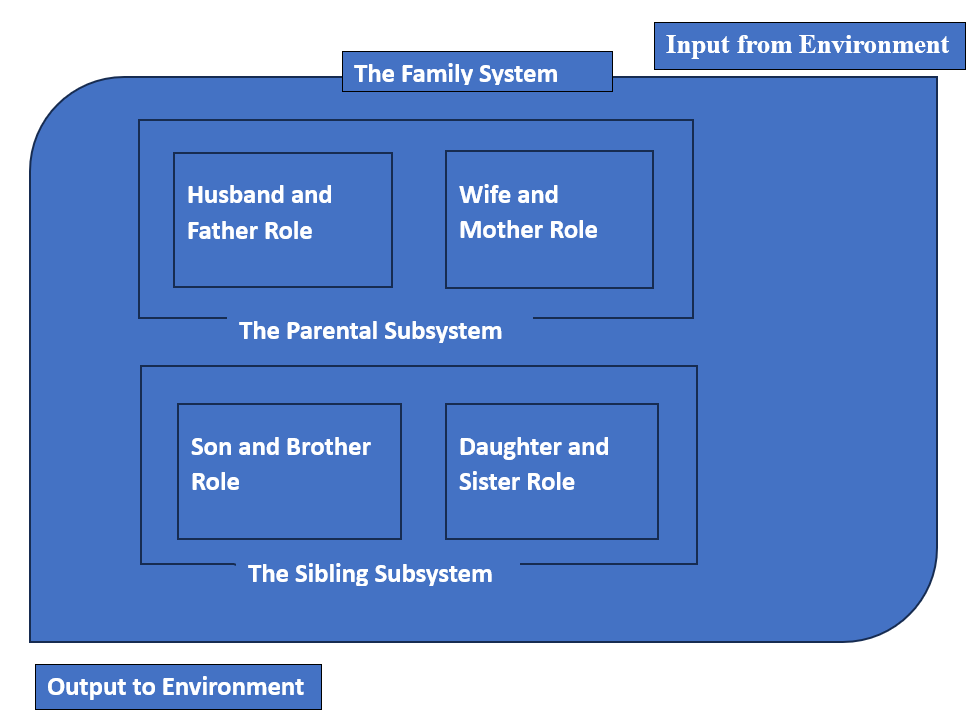The Family System: How it Should Be
The family is a complex system that, at its basic level, is made up of the individual. The individual interacts with other members to create subsystems. The system and the subsystems within are differentiated by the boundaries that set them apart. These boundaries define roles, responsibilities, and positions within the family system.
Boundaries are essential to the family system. The first boundary creates or differentiates the family from another family and sets the family apart from its environment.
The second boundary is the parental subsystem, which consists of the husband/father and the wife/mother unit.
The third boundary is the sibling subsystem, which consists of the son/brother and the daughter/sister unit.
If these boundaries are appropriately maintained and enforced, the family has a stable and orderly environment that aids in the development of each individual. The first boundary creates, defines, and protects the family.
It acts like a shield from harmful environmental inputs; the environment is anything and anyone that is not part of the family system. When this boundary is not clearly defined and communicated among family members and outsiders, chaos and disorder follow.
For example, if a family relative enters the system and takes the role of a parent, that can create conflict and rebellion between subsystem members. Therefore, the first boundary protects the family from outsiders and outside influence.
Another example is when social media influences children; in this case, social media plays the role of parents instructing and exploiting children. The result is children disobeying their parents, misbehaving behind their backs, sneaking, and dishonoring their instruction.
There are countless attacks against this first line of defense against the family, and parents must intentionally shield the family from everything that seeks to dismantle the family.
The parental subsystem is the foundation of the whole system; it consists of the husband, who has the role of a father, and the wife, who has the role of a mother. The husband/wife subsystem is the first system created at marriage. As children are added to the family, the system becomes much more complex, and boundaries can easily be crossed where roles can be switched.
For example, a spoiled and undisciplined child can take on the role of a parent by bossing around siblings and disregarding the parent’s instructions. If allowed, this child can develop the ego to boss around even the parents, and when he doesn’t get his way, there is an outburst of anger or whining and crying.
This is why parenting is so important; it keeps the boundaries of the family system defined and enforces the agreed-upon or unspoken rules that hold together the individual members. Members must be aware of the consequences when boundaries are crossed; if limitations don’t exist, then members will put up a fight until there is resistance.
As parents, our role is parenthood, not friendship; friendship naturally develops once we’ve trained children on how they should behave. The boundaries between a parent/child relationship differ significantly from that of a parent/friend. Children are treated as friends at home or school, so they learn to treat others as such, and this is a problem because they never know to be submissive to their parents and respectful to their teachers.
Lastly, just as there is an input into the system from the external environment, there is an output from the system to the environment. The family can influence its surrounding environment through the principles it lives by; it is constantly communicating to the world and demonstrating the values that matter most to it. This is what Matthew 5:16 means: “Let your light so shine before men, that they may see your good works, and glorify your Father which is in heaven.”
Our role within the family system is often apparent, and we live up to the expectations and standards. Still, sometimes, there is confusion and chaos, especially when parents fail to meet their role within the system.
In such a situation, parents must first understand their part in the system and then explain it to the children. They must be firm about each individual’s role within the system and how one acts, talks, and interacts with the rest of the family.

When individuals fail to respond appropriately, there must be consequences to correct the behavior. Consequences affirm the existing boundaries and discourage the repetition of the misconduct. At the end of the day, it is the parent’s responsibility to lay down the system's rules and define the boundaries between the systems. To do this, family meetings are a great way to abandon the old ways and begin a new chapter of how the family should be.
Ask yourself: What roles and boundaries define my family system?
If you found this helpful, please share and subscribe for free.




